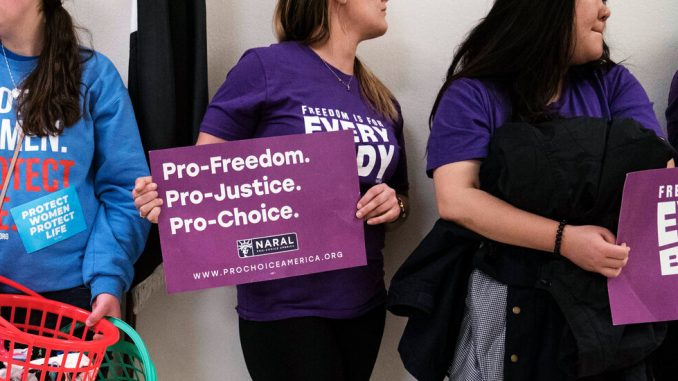
NARAL Pro-Choice America, one of the country’s largest advocacy groups for abortion rights, announced on Wednesday that it had changed its name, a switch that illustrates the issue’s shifting politics after the Supreme Court overturned federal abortion rights.
For decades, abortion rights activists cast their mission as a fight over health care and women’s rights. NARAL’s new name — Reproductive Freedom for All — is intended to align the group’s goals with a different argument: In the post-Roe era, the battle for abortion access is a fight for fundamental freedoms.
For abortion rights supporters, the term “pro-choice” — once widely used by Democrats — feels particularly dated in a country where abortion laws are now determined by individual states and jurisdictions, leaders of the group said.
“Pro-choice” does not resonate with the moderate, younger and male voters who have become more engaged since the Supreme Court ended the nationwide right to abortion last year, said Mini Timmaraju, NARAL’s president. The group’s old name also failed, she said, to reflect the work of Black and Hispanic women long on the front lines of the fight for abortion access.
“NARAL is incredibly resonant for the political world, but we’re not necessarily in the business anymore of just winning political opinion within elected officials and policymakers,” Ms. Timmaraju said. “We are now in a much bigger fight for the heart and soul of the American people and those are folks who are brand-new to the abortion debate.”
Along with the new name, the group plans to increase its focus on state organizing and to adopt a broader approach, joining causes like eliminating the Senate filibuster, supporting voting rights and expanding the Supreme Court.
Supporters and opponents of abortion rights have both started to reposition themselves as the contours of the political battle rapidly change. Some Republicans have urged their party to move away from the term “pro-life,” arguing that the label has become politically damaging for their candidates. Others have leaned in: A few weeks before the ruling that overturned Roe v. Wade, Susan B. Anthony List, the anti-abortion advocacy group, changed its name to Susan B. Anthony Pro-Life America.
But NARAL’s name change underscores how sharply abortion politics have shifted since the Supreme Court’s decision last year in Dobbs v. Jackson Women’s Health Organization.
For years, surveys showed that those who oppose abortion were more energized by the issue, viewing it as a litmus test for candidates. After the ruling, the politics flipped, with those supportive of abortion rights growing more motivated by the issue, while those opposed became less so.
The abortion rights movement has shifted its message from talking about abortion as health care to casting the legality of the procedure as an American liberty. It’s a message NARAL has been pushing since 2018, when an internal research project found the argument to be the most broadly persuasive.
It was a message many Democrats embraced in the 2022 midterm elections, casting abortion restrictions as a kind of government overreach. Republicans, meanwhile, used similar arguments during the pandemic and often invoked the word “freedom” to criticize mask mandates and other public health measures.
Reproductive Freedom for All is the fourth name change for the organization, which started as the National Association for the Repeal of Abortion Laws in 1969. After Roe was decided in 1973, it became the National Abortion Rights Action League. Reproductive Rights was added to its name in 1993. Then, in 2003, the group became NARAL Pro-Choice America, a change that coincided with a multimillion-dollar effort to make abortion a central topic in the 2004 presidential election.


Be the first to comment